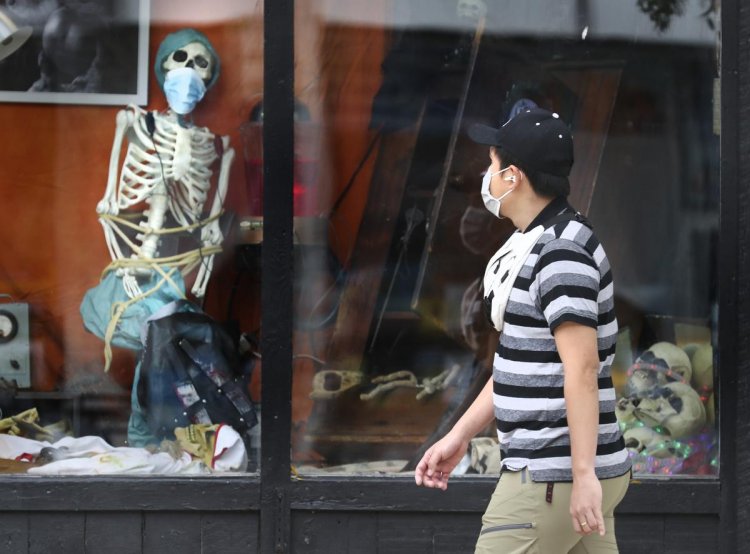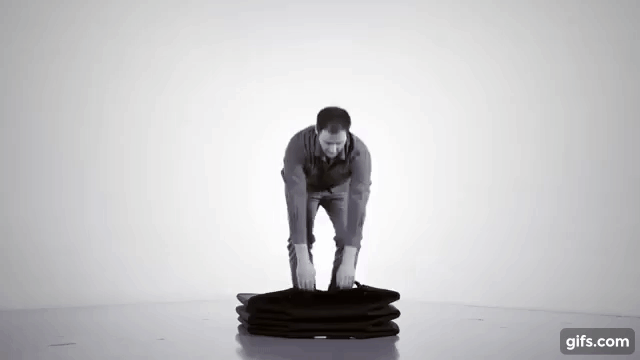Today’s coronavirus news: Ontario’s top doctor outlines precautions for Halloween, Thanksgiving; province reports 587 cases
The latest coronavirus news from Canada and around the world Thursday. This file will be updated throughout the day. Web links to longer stories if available.4:44 p.m. A Toronto-area transit company says it does not plan to require passengers to provide proof of COVID-19 vaccination before they ride, The Canadian Press reports.Metrolinx says it would be difficult to mandate COVID-19 vaccines for travellers on GO Transit and Union Pearson Express trains for logistical reasons, according to CP.Spokesman James Wattie says customers board the company’s trains and buses through hundreds of doors on its network that is connected to 14 different transit systems. Metrolinx, which is owned by the government of Ontario, operates large fleets of trains and buses in the Toronto and Hamilton areas.Wattie says the company was concerned some might think a proof of vaccination was required after the federal government announced plans to mandate COVID-19 vaccine for travellers on trains. The federal government said Wednesday passengers on VIA Rail and Rocky Mountaineer trains should be fully vaccinated by Oct. 30.4:06 p.m. This weekend’s Thanksgiving celebrations in Ontario may look a little more normal than they did last year, the province’s top public health official said Thursday, but there are still some precautions those marking the holiday should take, The Canadian Press reports. Here are some of Dr. Kieran Moore’s guidelines, according to CP, for those celebrating with people from outside their household:If possible, go virtual! Moore says virtual celebrations are still the safest option, particularly for those who haven’t been vaccinated against COVID-19.Smaller is better. The chief medical officer of health says smaller gatherings are always safer, and it’s important to follow public health rules. That means indoor gatherings should be capped at 25, and those outdoors can’t exceed 100.“Have the fewest number of people possible at your gathering!” provincial guidelines read.Keep it clean! Ensure hand-sanitizer, soap and water are accessible so everyone can wash their hands often, particularly when they are preparing and serving food, and before and after eating. Event organizers should also clean and disinfect surfaces that a lot of hands touch.If in doubt, stay home! Moore says anyone with any symptoms, even if they are mild, should stay home, lest they spread the virus to their loved ones. He says those who are immuno-compromised or unvaccinated should attend virtually or not at all. Wear a mask! Moore notes that anyone can wear a mask or keep a distance from others if it feels right, regardless of their vaccination status.But he said it’s more important to wear a face-covering and keep a distance when some people at an indoor gathering are unvaccinated, partially vaccinated or when their vaccination status is not known. Those attending outdoor gatherings with people who are not fully vaccinated should wear a mask if it’s not possible to keep a distance. Moore said it’s OK for a group of fully vaccinated people gathering together to take off their masks, if everyone is comfortable with it. 3:15 p.m.: Ontario’s chief medical officer of health says Thanksgiving and Halloween celebrations can go ahead this year, although with some COVID-19 precautions still in place, The Canadian Press reports.Last year, the province recommended kids in the COVID-19 hot spots of Toronto, Ottawa, Peel and York regions not go trick-or-treating, but this year Dr. Kieran Moore says kids should feel free to go door to door, according to CP.He says Halloween should happen outdoors as much as possible, with kids wearing a mask, not a costume mask, and not crowding doorsteps, or shouting too loudly.Moore says when celebrating Thanksgiving this weekend, people should use outdoor spaces whenever possible.When everyone is vaccinated, he says people can gather indoors without masks, but if there are people from multiple households and some guests are unvaccinated, people should wear face coverings and maintain a distance from one another.Moore says a number of recent outbreaks have been associated with weddings, and he notes that next week proof of vaccination will be required to attend weddings and funerals in meeting and event spaces.Ontario reported 587 new cases of COVID-19 Thursday, and six new deaths.Health Minister Christine Elliott said 423 of those cases are in people who are not fully vaccinated or have an unknown vaccination status.There are 149 people in intensive care units due to COVID-19.3:11 p.m. Quebec’s health system has welcomed more than 1,000 full-time nurses since the government offered one-time bonuses of up to $18,000 to help fill critical labour shortages in the network during and after the COVID-19 pandemic, The Canadian Press reports.More than 700 part-time nurses have switched to full-time work, 56 nurses came out of retirement and 231 new people have been hired from the private sector, Health Minister Christian Dubé


The latest coronavirus news from Canada and around the world Thursday. This file will be updated throughout the day. Web links to longer stories if available.
4:44 p.m. A Toronto-area transit company says it does not plan to require passengers to provide proof of COVID-19 vaccination before they ride, The Canadian Press reports.
Metrolinx says it would be difficult to mandate COVID-19 vaccines for travellers on GO Transit and Union Pearson Express trains for logistical reasons, according to CP.
Spokesman James Wattie says customers board the company’s trains and buses through hundreds of doors on its network that is connected to 14 different transit systems.
Metrolinx, which is owned by the government of Ontario, operates large fleets of trains and buses in the Toronto and Hamilton areas.
Wattie says the company was concerned some might think a proof of vaccination was required after the federal government announced plans to mandate COVID-19 vaccine for travellers on trains.
The federal government said Wednesday passengers on VIA Rail and Rocky Mountaineer trains should be fully vaccinated by Oct. 30.
4:06 p.m. This weekend’s Thanksgiving celebrations in Ontario may look a little more normal than they did last year, the province’s top public health official said Thursday, but there are still some precautions those marking the holiday should take, The Canadian Press reports.
Here are some of Dr. Kieran Moore’s guidelines, according to CP, for those celebrating with people from outside their household:
- If possible, go virtual! Moore says virtual celebrations are still the safest option, particularly for those who haven’t been vaccinated against COVID-19.
- Smaller is better. The chief medical officer of health says smaller gatherings are always safer, and it’s important to follow public health rules. That means indoor gatherings should be capped at 25, and those outdoors can’t exceed 100.
“Have the fewest number of people possible at your gathering!” provincial guidelines read.
- Keep it clean! Ensure hand-sanitizer, soap and water are accessible so everyone can wash their hands often, particularly when they are preparing and serving food, and before and after eating.
Event organizers should also clean and disinfect surfaces that a lot of hands touch.
- If in doubt, stay home! Moore says anyone with any symptoms, even if they are mild, should stay home, lest they spread the virus to their loved ones.
He says those who are immuno-compromised or unvaccinated should attend virtually or not at all.
- Wear a mask! Moore notes that anyone can wear a mask or keep a distance from others if it feels right, regardless of their vaccination status.
But he said it’s more important to wear a face-covering and keep a distance when some people at an indoor gathering are unvaccinated, partially vaccinated or when their vaccination status is not known.
Those attending outdoor gatherings with people who are not fully vaccinated should wear a mask if it’s not possible to keep a distance.
Moore said it’s OK for a group of fully vaccinated people gathering together to take off their masks, if everyone is comfortable with it.
3:15 p.m.: Ontario’s chief medical officer of health says Thanksgiving and Halloween celebrations can go ahead this year, although with some COVID-19 precautions still in place, The Canadian Press reports.
Last year, the province recommended kids in the COVID-19 hot spots of Toronto, Ottawa, Peel and York regions not go trick-or-treating, but this year Dr. Kieran Moore says kids should feel free to go door to door, according to CP.
He says Halloween should happen outdoors as much as possible, with kids wearing a mask, not a costume mask, and not crowding doorsteps, or shouting too loudly.
Moore says when celebrating Thanksgiving this weekend, people should use outdoor spaces whenever possible.
When everyone is vaccinated, he says people can gather indoors without masks, but if there are people from multiple households and some guests are unvaccinated, people should wear face coverings and maintain a distance from one another.
Moore says a number of recent outbreaks have been associated with weddings, and he notes that next week proof of vaccination will be required to attend weddings and funerals in meeting and event spaces.
Ontario reported 587 new cases of COVID-19 Thursday, and six new deaths.
Health Minister Christine Elliott said 423 of those cases are in people who are not fully vaccinated or have an unknown vaccination status.
There are 149 people in intensive care units due to COVID-19.
3:11 p.m. Quebec’s health system has welcomed more than 1,000 full-time nurses since the government offered one-time bonuses of up to $18,000 to help fill critical labour shortages in the network during and after the COVID-19 pandemic, The Canadian Press reports.
More than 700 part-time nurses have switched to full-time work, 56 nurses came out of retirement and 231 new people have been hired from the private sector, Health Minister Christian Dubé told reporters Thursday. In total, 1,007 more full-time nurses have entered the health system since the government announced the bonuses in late September, according to CP.
Dubé said another 1,900 people are negotiating with the province.
On Sept. 23, the government announced it had budgeted $1 billion to offer full-time nurses bonuses of up to $18,000 to prevent more of them from leaving the public healthcare system and to entice those who have left to come back. The government had estimated it was missing at least 4,000 full-time nurses.
Those bonuses only applied to fully vaccinated nurses, however. Dubé said the government was holding firm on a deadline for all health-care workers in the province to be vaccinated by Oct. 15 or be suspended without pay.
3:02 p.m. Visitors will need to show proof of vaccination when entering a hospital in Nova Scotia starting next week, reports The Canadian Press.
Nova Scotia Health announced visitors, including support people and designated caregivers, will need to show proof of being fully vaccinated against COVID-19 starting Oct. 13, according to CP.
The new rule also includes people accompanying patients who are entering hospitals or clinics for appointments or procedures.
Exemptions may be made for emergency situations and end-of-life care, officials said Thursday.
Proof of vaccination will not, however, be required for patients seeking care or receiving treatment.
The measure comes after the provincial government announced a vaccination mandate for workers in the healthcare and education sectors late last month.
A mandatory vaccination mandate has also been put in place for employees with the Halifax Regional Municipality.
The city says all municipal employees will need to be fully vaccinated by Dec. 15. Those who aren’t vaccinated by then will face consequences, including unpaid administrative leave, unless they can provide an exemption.
The vaccine mandate will also be a condition of employment for new municipal hires.
Meanwhile, the province reported 30 new cases of COVID-19, of which 26 are in the central health zone including Halifax, where there is spread among unvaccinated residents.
There are also two cases each in the western and eastern zones.
The number of active cases sits at 247 due to 36 new recoveries reported. Sixteen people are in hospital, including five in ICU.
2:48 p.m. The federal government is working on exemptions to its newly released mandatory vaccine policy for people in remote Indigenous communities, many of which are only accessible by airplane, reports The Canadian Press.
The new policy calls for travellers over the age of 12 to provide proof they’ve received two doses of a Health Canada-approved vaccine at least 14 days before boarding a plane or train, according to CP.
There are 182 communities that have been assessed by Transport Canada or the provinces and territories as “remote.”
The vast majority are so isolated, the only way in and out is by plane, and essential services, such as medical visits, are not accessible by any other means of transportation.
Accommodations could include asking for a negative molecular COVID-19 test, rather than proof of full vaccination, according to a statement from the office of federal Transport Minister Omar Alghabra.
Government officials are meeting with Indigenous organizations and representatives from provincial and territorial governments to come up with a solution before the new policy comes into effect at the end of the month.
2 p.m.: Alberta Premier Jason Kenney is to deliver an update this afternoon on the province’s COVID-19 situation ahead of the Thanksgiving holiday weekend.
Kenney has urged Albertans to follow gathering limits to prevent further strain on severely stressed hospitals.
He has noted that family gatherings last Thanksgiving sparked a renewed wave of COVID-19 cases.
No indoor social gatherings are allowed for the unvaccinated and the limit is 10 for those who have had their shots — but from no more than two households.
Kenney is to joined by Jobs Minister Doug Schweitzer to talk about COVID-19 support for businesses.
Alberta has the most active coronavirus cases in the country at nearly 19,000 infections and 247 patients in intensive care.
1:55 p.m.: A hospital in southwestern Ontario says it has fired 57 employees who failed to get vaccinated against COVID-19.
The Windsor Regional Hospital says it has also suspended six “professional staff” — people who had privileges to practise at the facility but weren’t employees — on what it describes as a “mid-term basis.”
It says 4,155 employees and professional staff, about 98.5 per cent of the workforce, complied with its immunization policy. The hospital says 32 of those who refused to get vaccinated were clinical staff, while 25 were non-clinical.
The hospital set a deadline of Thursday for staffers to get their first dose of a COVID-19 vaccine, unless they had a medical reason for not getting the shot.
1:45 p.m. An independent group that analyzes the course of the COVID-19 pandemic in British Columbia and Canada has released new modelling containing some good news but also raising concerns, especially about the impact of the virus on children.
The report by 12 epidemiologists, mathematicians and data analysts, from the universities of Victoria and British Columbia, Simon Fraser University and the private sector, covers the period up to Oct. 4.
It shows pressure on B.C.’s intensive care units remains near peak levels but that COVID-19 cases stabilized through September due to masking, vaccination and other public health measures.
However, the report finds cases among B.C. youngsters rose steeply in the Fraser, Interior and Vancouver Island health authorities as children account for nearly 50 per cent of unvaccinated residents in the province.
It says as vaccinations allow for looser restrictions, the COVID-19 infections among those under 12 are higher than at any other time in the pandemic and at least 20 per cent will have had the virus within two years.
1:30 p.m. Visitors will need to show proof of vaccination when entering a hospital in Nova Scotia starting next week.
Nova Scotia Health announced visitors, including support people and designated caregivers, will be required to show proof of being fully vaccinated against COVID-19 starting Oct. 13.
The new rule also includes people accompanying patients who are entering hospitals or clinics for appointments or procedures.
Officials say exemptions may be made for emergency situations and end-of-life care.
Proof of vaccination will not, however, be required for patients seeking care or receiving treatment.
The measure comes after the provincial government announced a vaccination mandate for workers in the health-care and education sectors late last month.
12:40 p.m. Saskatchewan is activating its emergency operations centre to lead its response to record levels of COVID-19.
Premier Scott Moe says the move will better co-ordinate the pandemic response between government ministries and staff, and provide administrative support so health-care workers can focus on treating patients.
He says the province’s chief medical health officer will continue to be responsible for public health recommendations and orders.
On Wednesday, the province reported 356 people in hospital with COVID-19, including 76 in intensive care — the highest since the pandemic began.
Saskatchewan has the highest rate of new daily cases COVID-19 in the last week of any province in the country.
Moe says most COVID-19 patients in hospital are not vaccinated and people need to stop spreading conspiracy theories about vaccines.
12:22 p.m. Ontario is reporting another 587 COVID-19 cases and six more deaths, according to its latest report released Thursday morning.
Ontario has administered 25,240 vaccine doses since its last daily update, with 21,974,193 vaccines given in total as of 8 p.m. the previous night.
According to the Star’s vaccine tracker, 11,309,114 people in Ontario have received at least one shot. That works out to approximately 86.8 per cent of the eligible population 12 years and older, and the equivalent of 76.1 per cent of the total population, including those not yet eligible for the vaccine.
Read the full story from the Star’s Dorcas Marfo
11:55 a.m. Last week, Vice Admiral Henrique Gouveia e Melo, co-ordinator of Portugal’s COVID-19 vaccine task force, said goodbye to most of his staff.
Then he went home and slept for 12 hours.
With more than 95 per cent of its eligible population vaccinated, Portugal says it no longer needs a vaccine task force.
As Canada and other wealthy nations experience some stagnation in vaccine uptake, many are looking to Portugal for lessons. About 12 per cent of eligible Canadians have yet to receive one dose of a COVID-19 vaccine, and 18 per cent have yet to receive their second.
Read the full story from the Star’s Lex Harvey
11:35 a.m. Quebec’s health minister says about 25,000 health workers in the province are still not fully vaccinated about one week ahead of the deadline.
Christian Dubé told reporters today about 13,000 employees have not received a single dose of vaccine.
Quebec has set a firm Oct. 15 deadline for health sector employees to be fully vaccinated or be suspended without pay.
Dubé is calling on workers to get a first dose and says there won’t be any religious exemptions granted to them. He says a contingency plan to deal with missing staff will be unveiled next week.
Meanwhile, health officials are reporting 624 new COVID-19 cases today and five more deaths attributed to the coronavirus.
10:20 a.m. (updated) Ontario is reporting 587 new cases of COVID-19 Thursday, and six new deaths.
Health Minister Christine Elliott says 423 of those cases are in people who are not fully vaccinated or have an unknown vaccination status.
There are 149 people in intensive care units due to COVID-19.
Of those people in intensive care, 12 are fully vaccinated, seven are partially vaccinated, 72 are unvaccinated, and the remaining 58 have an unknown vaccine status.
Today there were 121 new school-related cases reported, with 106 in students and 15 in staff.
Nearly 82 per cent of eligible Ontarians are fully vaccinated and 86.7 per cent have received at least one dose.
10:13 a.m. Pfizer Canada says it is preparing to ask Health Canada to authorize its COVID-19 vaccine for kids as young as five by mid-October.
The U.S. drugmaker submitted a formal request to the U.S. Food and Drug Administration today and the FDA intends to meet to discuss the submission on Oct. 26.
Last week Pfizer submitted data to both governments from a clinical trial on children five to 11 but hadn’t formally requested authorization.
A spokeswoman for the company’s Canadian arm says it is in the final stages of working with Health Canada ahead of the submission being made so kids between five and 11 can be given the shots here.
The vaccine was authorized for people at least 16 years old in December 2020 and for teenagers between 12 and 15 in May.
The dose for younger children is one-third the size given to adults and Pfizer and Health Canada have not yet said if vaccine supplies already in Canadian freezers can be adapted for use on children or if new shipments must be made.
9:04 a.m. The number of Americans applying for unemployment benefits fell last week, another sign that the U.S. job market and economy continue their steady recovery from last year’s coronavirus recession.
Unemployment claims fell by 38,000 to 326,000, the first drop in four weeks, the Labor Department said Thursday. Since surpassing 900,000 in early January, the weekly applications, a proxy for layoffs, had fallen more or less steadily all year. Still, they remain elevated from pre-pandemic levels: Before COVID-19 hammered the U.S. economy in March 2020, weekly claims were consistently coming in at around 220,000.
After hitting a pandemic low of 312,000 in early September, claims had risen three straight weeks, suggesting that the highly contagious delta variant was at least temporarily disrupting a recovery in jobs.
8:36 a.m. Pfizer asked the U.S. government Thursday to allow use of its COVID-19 vaccine in children ages 5 to 11 — and if regulators agree, shots could begin within a matter of weeks.
Many parents and pediatricians are clamoring for protection for children younger than 12, today’s age cutoff for the vaccine made by Pfizer and its German partner BioNTech. Not only can youngsters sometimes get seriously ill, but keeping them in school can be a challenge with the coronavirus still raging in poorly vaccinated communities.
Pfizer announced in a tweet that it had formally filed its application with the Food and Drug Administration.
Now the FDA will have to decide if there’s enough evidence that the shots are safe and will work for younger children like they do for teens and adults. An independent expert panel will publicly debate the evidence on Oct. 26.
One big change: Pfizer says its research shows the younger kids should get a third of the dose now given to everyone else. After their second dose, the 5- to 11-year-olds developed virus-fighting antibody levels just as strong as teens and young adults get from regular-strength shots.
8:22 a.m. This Thanksgiving will be a tough one for Carol Charles and her family.
The 50-year-old from Regina usually travels to her younger sister’s house in Edmonton for the holiday.
But Jennifer Rosebluff-Thomas died of COVID-19 last month. She was about 29 weeks pregnant with her ninth child. She was also unvaccinated and contracted the more dangerous Delta variant.
“When they did the emergency C-section, they explained to me that it was to help my sister get more oxygen into her lungs, and they confirmed at that same time that she wasn’t vaccinated and that it was preventable,” Charles said.
“That was the most hurtful part, when they told me it was preventable.”
8:17 a.m. Despite a nearly year-long efforts to immunize seniors against COVID-19, Toronto is one of the health units with the lowest vaccine coverage rates in the province among the 80-plus age group.
Just 87 per cent of seniors over 80 in Toronto have received both doses of the vaccine, according to city data. And Ontario as a whole is lagging behind other provinces when it comes to this age group.
The Toronto health unit is one of three reporting immunization rates under 90 per cent for older Ontarians, according to the province’s data tool, a Ministry of Health spokesperson confirmed this week. The Northwestern health unit is recording just 86.6 per cent uptake of both doses among adults 80 and above. In Lambton, 89.7 per cent of seniors in that age category are fully immunized.
Read the full story from the Star’s Maria Sarrouh
7:55 a.m. Toronto Public Health has declared outbreaks at Dante Alighieri Academy, Stephen Leacock Collegiate Institute, St. Jude Catholic School, St. Augustine Catholic School, Millwood Junior School and Huron Street Junior Public School.
“We’re carefully investigating & following our process of working with our school community to notify close contacts and ask them to stay home, monitor for symptoms & get tested,” TPH tweeted.
7:40 a.m. Los Angeles leaders have voted to enact one of the nation’s strictest vaccine mandates.
The sweeping measure requires the shots for everyone entering bars, restaurants, nail salons, gyms and a Lakers game. The City Council on Wednesday voted 11-2 in favor of the ordinance that will require proof of full vaccination by Nov. 4.
Supporters say it’s a way of preventing more coronavirus surges. Critics say the measure raises concerns about enforcement.
The nation’s second-most populous city faced a huge rise in infections and hospitalizations last winter and a smaller surge this summer linked to the spread of the Delta variant.
7:30 a.m. Torontonians can expect to pay a premium on their energy bills this winter as prices for North American fuel, natural gas and coal reach heights not seen in years.
Dan McTeague, president of Canadians for Affordable Energy, projects that gasoline prices at Greater Toronto Area pumps will hit $1.50 per litre in the coming weeks, up 44 per cent from a year ago.
That would be the highest price point for auto fuel anywhere in Ontario since the summer of 2014, when a litre sold for $1.43.
And unlike price surges in recent years, experts say this one could last longer than a few weeks.
Read the full story from the Star’s Jacob Lorinc
7:15 a.m. More pollution, billions of dollars in lost productivity, poorer health and increased stress. All of those problems could await residents of post-pandemic Toronto, if the city doesn’t get a handle on its resurgent traffic woes.
Eighteen months after COVID-19 plunged Toronto into crisis and emptied out its streets, drivers have returned to the roadways in numbers this fall. The city’s famous gridlock is back.
And while the roads are not yet as crowded as before the pandemic, there are troubling signs that the travel patterns that have taken root over the last year and a half could pose a serious threat to the city’s long-term sustainability.
For one, the roadways are busy again despite the city’s office occupancy remaining historically low and commuters staying home. Secondly, and perhaps more worryingly, car use is returning at much faster rates than transit ridership.
Read the full story from the Star’s Ben Spurr
6:01 a.m.: The National Advisory Committee on Immunization and the Society of Obstetricians and Gynecologists of Canada recommend that pregnant women get two doses of COVID-19 vaccine.
Dr. Deena Hinshaw, Alberta’s chief medical officer of health, recently stressed that pregnant women are at a high risk of severe outcomes from the infection.
“With a lot of misinformation about pregnancy and vaccinations circulating online, I would like to assure Albertans that mRNA COVID-19 vaccines are safe for those who are pregnant or breastfeeding,” she tweeted last month. “There is also no evidence that COVID-19 vaccines cause fertility problems.”
Kerry Williamson, a spokesman for Alberta Health Services, said that from July 15 to Sept. 28 of this year, 14 pregnant women were admitted to intensive care units.
All of them had been unvaccinated, he said.
“We need those who are pregnant, trying to become pregnant or have recently delivered to get both doses of the COVID-19 vaccine as soon as possible,” Williamson wrote in an email.
“Vaccines are safe and effective, and they are the best way to protect you and your baby from COVID-19.”
He said there is no data available about how many pregnant Albertans have died from the virus.
6 a.m.: Ontario’s chief medical officer of health is set to release his advice today for safely celebrating Thanksgiving and Halloween.
Earlier this week, Dr. Kieran Moore did touch on some of his recommendations for Thanksgiving, saying celebrating indoors and unmasked with a fully vaccinated group is “absolutely appropriate.”
Ontario’s gathering limits of 100 outdoors and 25 indoors are still in place.
Moore says if there is a combination of vaccinated and unvaccinated people in the group, attendees may consider keeping masks on indoors, particularly for older people or those with chronic medical conditions.
Last year, Ontario recommended that kids in the four COVID-19 hot spots at the time, which were Toronto, Ottawa, Peel and York regions, should not go trick-or-treating.
5:58 a.m.: The World Health Organization is working to ship COVID-19 medical supplies into North Korea, a possible sign that the North is easing one of the world’s strictest pandemic border closures to receive outside help.
WHO said in a weekly monitoring report that it has started the shipment of essential COVID-19 medical supplies through the Chinese port of Dalian for “strategic stockpiling and further dispatch” to North Korea. WHO officials on Thursday didn’t immediately respond to requests for more details, including what those supplies were and whether they had yet reached North Korea.
Describing its anti-virus campaign was a matter of “national existence,” North Korea had severely restricted cross-border traffic and trade for the past two years despite the strain on its already crippled economy.
Thursday 5:57 a.m.: Can I get the flu and COVID-19 vaccines at the same time?
Yes, you can get the shots in the same visit.
When COVID-19 vaccines were first rolling out in the U.S., the Centers for Disease Control and Prevention recommended waiting 14 days between the shots and other immunizations as a precaution. But the agency has since revised its guidelines and says the wait is unnecessary.
The CDC and other health experts point to past experience showing that vaccines work as they should and any side effects are similar whether the shots are given separately or in the same visit.
“We have a history of vaccinating our kids with multiple vaccines,” says flu specialist Richard Webby of St. Jude Children’s Research Hospital.
Staying up to date on all vaccinations will be especially important this year, experts say.
Since people were masked and staying home, last year’s flu season barely registered. This year, it’s unclear how intense the flu season will be with more places reopening.



















:quality(85):upscale()/2025/02/06/058/n/1922283/129f882767a552c24f3258.03674924_.png)
